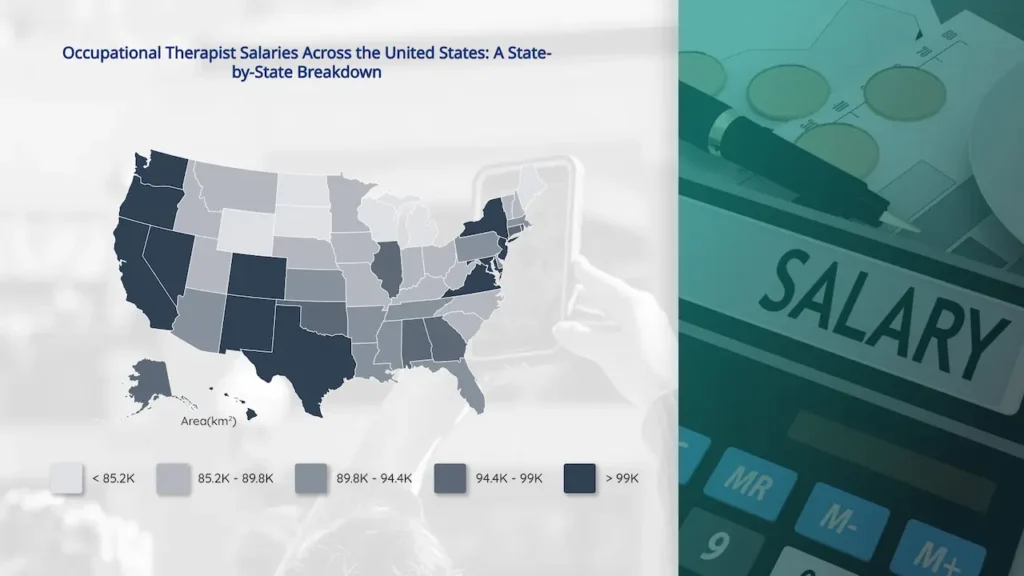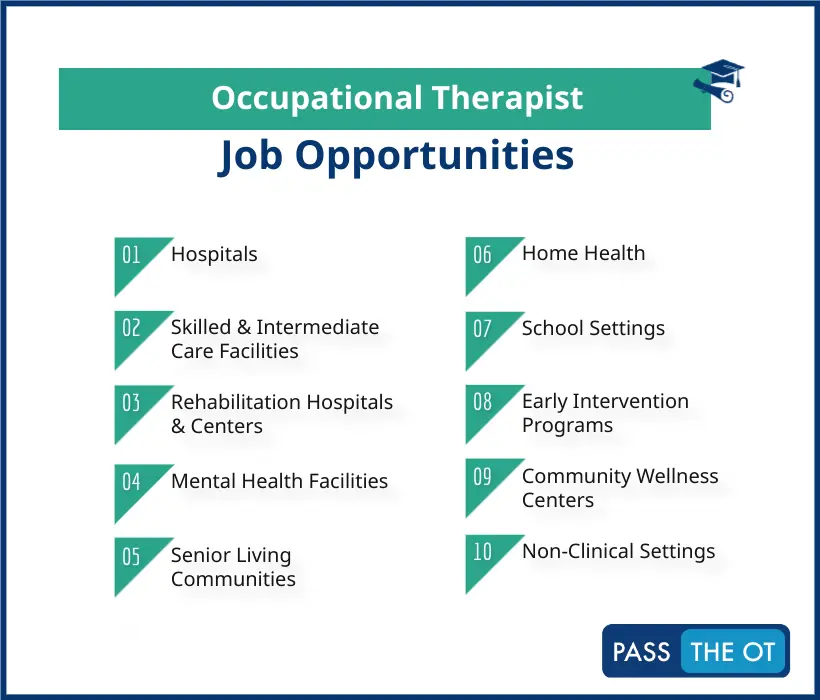REWARDING WORK GUARANTEED TO MAKE A POSITIVE IMPACT
Occupational therapy is a challenging but extremely rewarding profession. It is considered one of the most fulfilling and flexible careers in healthcare, with most occupational therapy practitioners choosing this profession due to a passion for helping people lead healthier, more productive lives. This profession is regarded as one of the few healthcare disciplines that doesn’t require providers to be on call, work nights and weekends, or take double shifts. Coupled with its focus on improving quality of life and the versatility of work roles across many practice settings, occupational therapists are coveted jobs in the medical field.
Occupational therapy is a growing healthcare field in the United States, and employment opportunities are expected to increase steadily. The United States Bureau of Labor Statistics (BLS) has consistently placed occupational therapists (OTs, OTRs®, or OT/Ls) on their list of the fastest-growing occupations. In 2023, the BLS predicted much faster than average job growth (11% or more) for OTRs® in the next decade. As there is already a shortage of OTRs® in the USA, you will always have work, and it’s doubtful that you will be replaced by artificial intelligence (AI) or other automated technologies. After all, you are part of a client-centered profession since OT interventions are all based on each individual’s needs, goals, and preferred occupations.
SALARIES
OTRs® may not earn as much as other professionals, but this profession offers a stable income. It does not require lengthy academic training, making it desirable for people who have a family to support, cannot afford much schooling, or are embarking on a second career path later in life.
According to the BLS, the median annual wage for occupational therapists was $96,370 as of August 2023. Depending on a therapist’s place of employment and work arrangement (e.g., if they work part-time, full-time, or per diem), some therapists may have an hourly job instead of a salaried one. In this case, the average hourly rate for an OTR® as of August 2023 is $46.33 per hour.
| Industry | Hourly mean wage | Annual mean wage |
| Management of Companies and Enterprises | $ 55.44 | $ 115,310 |
| Home Health Care Services | $ 53.11 | $ 110,460 |
| Outpatient Care Centers | $ 52.26 | $ 108,690 |
| Nursing Care Facilities (Skilled Nursing Facilities) | $ 48.91 | $ 101,740 |
| Specialty (except Psychiatric and Substance Abuse) Hospitals | $ 48.70 | $ 101,290 |
As with most work roles, an OTR’s® salary has the potential to increase as providers gain experience. Other factors also determine OTR® salary. One such example is location, since someone who works and resides in a place with a higher cost of living will have a higher salary than someone in a city with a lower cost of living.
Company size is also correlated with OTR® salary, as smaller clinics and local hospitals may not be able to offer as high of a salary as larger health systems or multi-practice facilities. High-performing OTRs® may also see slightly higher wages than their counterparts. Depending on the organization, performance may be evaluated through consistently high productivity rates, good performance reviews, and patient commendations.
Some occupational therapists may assume higher-level roles, such as program developer, regional rehabilitation manager, or director of rehabilitation, which can impact their earning potential. However, these roles typically involve much more than patient care, so they differ from traditional occupational therapist positions.
Someone’s skill level is also a deciding factor in how much they earn. An OTR® with 15+ years of experience is likely to make more money than a newly graduated OTR®, especially if the more seasoned clinician has changed places of employment.
In some cases, a higher skill level indicates a provider has an official or unofficial specialty. Unofficial specialties usually involve a demonstrated work history or the completion of continuing education in a specific practice setting, such as orthopedics or pediatrics. Official specialties take the form of added credentials or certifications in one particular practice area of OT beyond the board certification required to practice as an OTR®. While these factors are not always associated with pay increases, they may increase earning potential for an OTR®.
So, as you can see, there is some variation in OTR® salary, making it difficult to predict exactly how much someone will earn in this field. Overall, though, OTRs® tend to make a good living.

DIVERSE PLACES TO WORK
The United States of America offers exceptional opportunities for occupational therapy practitioners due to the high demand for the expertise of rehabilitation professionals. After becoming certified and licensed, OTRs® can choose what setting and population they prefer their work to focus on.
Work places include:
- Hospitals (short-term inpatient facilities)
- Skilled and intermediate care facilities (subacute care facilities, also known as skilled nursing facilities)
- Rehabilitation Hospitals and Centers (also known as acute rehabilitation hospitals)
- Mental health facilities (inpatient psychiatric hospitals, outpatient clinics, and clubhouse programs)
- Senior Living Communities (assisted living facilities, some of which have joint independent living facilities while others do not)
- Senior day programs (may also be known as adult day care centers)
- Home Health (provided for those who need rehab but cannot seek it elsewhere due to being homebound)
- Early intervention programs (provided within the home for babies between 0 and 3 years)
- School settings (therapeutic day schools, private schools, public schools)
- Community wellness centers
- Outpatient clinics (hand therapy clinics, sensory gyms, orthopedic clinics)
- Non-clinical settings, assuming roles such as educator, fieldwork coordinator, or program chair
OPPORTUNITIES TO EXPLORE THE USA
If you are interested in seeing the country, travel occupational therapy can be lucrative as well as rewarding.
States with the Highest Employment level in Occupational Therapy
| State | Employment | Hourly mean wage | Annual mean wage |
| California | 12,470 | $ 48.85 | $ 101,610 |
| Texas | 10,570 | $ 48.85 | $ 101,610 |
| New York | 10,460 | $ 51.70 | $ 107,530 |
| Florida | 8,100 | $ 44.62 | $ 92,820 |
| Illinois | 7,270 | $ 46.23 | $ 96,160 |
TESTIMONIALS FROM PATIENTS REGARDING OT’S IMPACT IN THEIR LIVES

The day an occupational therapist changed my life–
5 individuals tell their stories of how their lives were turned around by the help and support from an occupational therapist.
Martin B
“In December 2010 I was rushed to hospital with a brain hemorrhage. I was in there for two weeks and came out on New Year’s Eve. I thought I’d soon be ready to go back to work, but when my OT came to interview me, I fell asleep as she was talking to me. She gave me tools to stop the fatigue setting in. Just a 10 or 15 minutes meditation, even in a noisy room, and I get my energy back and am ready to go again. It was six months before she finally said: ‘You’re fit to go to work now.’ It was a sad day when she said she was totally discharging me, because I was losing that safe place. I didn’t think occupational therapy would help somebody like me. It’s such an eye-opener. I can never thank her enough.”
Mike K
“I was on holiday 16 years ago and I dived into a swimming pool, not realizing it was the shallow end. I hit my head on the bottom and broke my neck. I spent 10 months in a hospital in Glasgow, where I received occupational therapy. It was just learning to do things with the limited mobility I had in my hands – picking things up, fastening buttons, dressing myself, the things you take for granted. Before my accident, sport was my main interest. While I was at the unit, I was able to use the hydrotherapy pool and take part in sports days. When I came out I took up wheelchair rugby and competed in the 2012 Paralympics. If it wasn’t for the OTs, I would never have had the opportunity.”
Esther R
“I had my fall after stepping on the worktop in my kitchen to reach the meter, which is in a high cupboard, and landed on my shoulder, fracturing my humerus. The specialist from the fracture clinic decided it needed to be pinned and have a plate put in. Once back at home, I had an OT from the rehab team come in and see me twice a day for a week, and then in the mornings for a week after that. They helped with the dressing, and I also had to have help with drying my feet and back. It was not only a help in the practical sense but a pleasure to know someone was coming in. We joked and got on. It was invaluable.”
Maria S
“I’ve had a double lung transplant. Last year, I was told about a new choir called Singing 4 Breathing, for people with chronic obstructive pulmonary disease (COPD), run by OT students at Northampton University, so I went along to find out what it was all about. There are 50 of us, we meet weekly and sing a mix of folk and pop songs. The teacher has taught us how to breathe when singing. It makes you feel so happy and joyful. I never knew I could sing a tune. It’s so amazing when you think you can’t speak because you have COPD, and yet you can sing.”
Joe L, and his son Tom
“Our son Tom suffered a huge brain injury when he was born. About 40% of the left side of his brain had been damaged. We were told he would find certain things very challenging, especially speech, high-capacity functions and movement. We met Anne Gordon, who manages the OT team at Evelina London children’s hospital, when Tom was six months old. Tom would never grab anything with his right hand, so Anne suggested using constraint-induced movement therapy, which meant restricting his left hand, forcing him to use his right hand. Tom’s right hand is still affected, but he can now grab a ball with both hands, and hold a cup – things that other people would think is not that big a deal, but for us it’s absolutely massive.”
Source: The Guardian
Ready to Get Started?
If you’re ready to crush your NBCOT® exam, we invite you to contact Pass the OT today for more information.
FAQ
Will choosing OT as a career give me job security?
Yes- According to the US Bureau of Labor Statistics (https://www.bls.gov/), employment of occupational therapists is projected to grow 11 percent from 2023 to 2033, much faster than the average for all occupations. About 9,800 openings for occupational therapists are projected each year, on average, over the decade.
What is my earning potential as an OT?
According to the US Bureau of Labor Statistics (https://www.bls.gov/), the median annual wage for occupational therapists was $96,370 in May 2023.
How can I earn more money as an OT?
Pick a high-paying setting.
According to www.myotspot.com the top paying OT jobs are currently as follows:
- Home Health OT.
- Hospital-based OT (Acute care or Inpatient rehab)
- Academia.
- Skilled Nursing Facilities.
- Non-traditional OT Roles.
What is unique about the field of OT?
Holistic Approach
What is unique to OT and what sets it apart from other healthcare professions, is its holistic approach to patient care. OT practitioners focus not only on patients’ physical health but also on their mental, emotional, and social well-being.
Treat patients across the lifespan
As the American Occupational Therapy Association (AOTA) outlines, occupational therapy is the only profession that has the privilege to help people across the lifespan. OTPs can treat a diverse patient population and easily transition into a new setting should they seek a career change.









